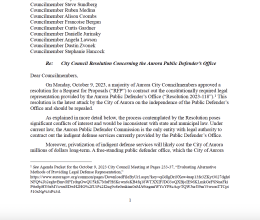The American Civil Liberties Union of Colorado (ACLU) filed suit today in federal court to challenge the censorship of books, newspapers, magazines, and political commentary in the Colorado Department of Corrections (DOC). The plaintiffs include the Association of Alternative Newsweeklies; eight publishers of periodicals that have been censored, including Denver's weekly alternative newspaper, Westword; and inmates at various Colorado prisons.
The lawsuit alleges that the DOC's criteria for screening books and periodicals are overly broad, subjective, and unconstitutionally vague. "The result is an arbitrary, erratic, inconsistent and irrational regime of censorship that repeatedly violates the constitutional rights of publishers as well as prisoners," said Mark Silverstein, ACLU Legal Director.
"The First Amendment protects the right of prisoners to read information and opinion from a wide variety of sources," said Hugh Gottschalk, of Wheeler, Trigg and Kennedy, a volunteer cooperating attorney who filed the case for the ACLU. "Similarly, publishers have a First Amendment right to reach their readers, including prisoners."
"The DOC is clearly entitled to prohibit publications that contain escape plans, instructions for making weapons, or publications that pose a real threat to prison rules or prison security," Gottschalk continued, "but Colorado prison officials are going far beyond the bounds of such reasonable and constitutionally-permitted censorship."
According to the lawsuit, inmates are forbidden to receive political commentary if prison officials determine that an article encourages "hatred or contempt of other persons," and at least one issue of Westword was censored on this basis. "A regulation with such broad language can be used to censor almost anything, from the editorial page of a daily newspaper to the Bible," Gottschalk said. "The DOC has improperly relied on this vague regulation to censor commentary that does nothing more than criticize government policy."
Another basis for censorship targeted in the lawsuit concerns "security threat groups" (STGs), a prison term for gangs. Publications are censored if DOC officials conclude that they are "produced or distributed by" STGs or if they contain material "advocating or depicting association or membership" in STGs. According to the ACLU, numerous legitimate publications have erroneously been branded with the stigmatizing STG label.
"Publications like Denver's alternative weekly, Westword, and the entertainment magazine Rolling Stone have been censored on the ground that they encourage hatred or contempt or that they are so-called security threat groups," Silverstein said. "These labels are obviously erroneous. But DOC officials label these publications without providing the publishers with any notice or any opportunity to explain why that label is mistaken. That violates the due process rights of the publishers."
Silverstein said that music magazines catering to an African American audience are particularly likely to be censored as gang-related. "Entire issues of music magazines such as Vibe have been censored as 'gang-related' because they contain articles or advertisements with photographs of rap performers," Silverstein explained. "According to the DOC, the photographs depict special gang hand signs."
"The censorship of these music magazines reflects a racist paranoia," Silverstein said. "Some DOC censors apparently see 'gang signs' in every photo in which the hands of an African American performer hand are visible." The DOC's paranoia about hand signs is so extreme, Silverstein added, that one prisoner was forbidden to receive a book about American Sign Language, which he wanted to learn so he could communicate with his deaf niece on family visits.
The lawsuit also alleges that prisoners have no meaningful opportunity to appeal a decision to censor their reading material. Although prisoners can file grievances, the lawsuit alleges that decision makers decide the prisoners' appeals without reviewing the material that has been censored.
The lawsuit asserts that the DOC's censorship is erratic and inconsistent. One example cited is Vibe magazine, which is routinely banned as gang-related at the Colorado Women's Correctional Facility in Canon City but is routinely permitted at a similar DOC women's facility in Denver.
According to the ACLU, the list of reading material unjustifiably banned by DOC censors includes political commentary from both the left and right; religious periodicals; critiques of the criminal justice system; publications that advocate for prisoners' rights; music magazines; a report issued by the European Parliament; David Mamet's play, The Spanish Prisoner; Laura Esquivel's novel, Like Water For Chocolate; and a book criticizing hate groups by Morris Dees, Director of the Southern Poverty Law Center. Unlike lawsuits challenging prison censorship in other states, this one does not deal with sexually explicit publications.
In addition to seven prisoners, the plaintiffs include the Association of Alternative Newsweeklies; New Times, Inc., which publishes Westword; Dark Night Press, which publishes commentary on Native American issues; Clayton Douglas, publisher of Free American Newsmagazine, a conservative-oriented magazine of political news and commentary; Larry Rice, publisher of Cry Justice Now Newspaper, a religiously oriented publication directed to prisoners; Doret Kollerer, publisher of North Coast Xpress; Christine Donner, coordinator of the Prisoner's Rights Project of the Rocky Mountain Peace and Justice Center in Boulder, which publishes a newsletter called Shut Them Down; Barrio Defense Committee, which publishes Voz del Barrio Atzlan; and Maoist Internationalist Movement, which publishes MIM Notes, a bi-monthly journal of political commentary.
